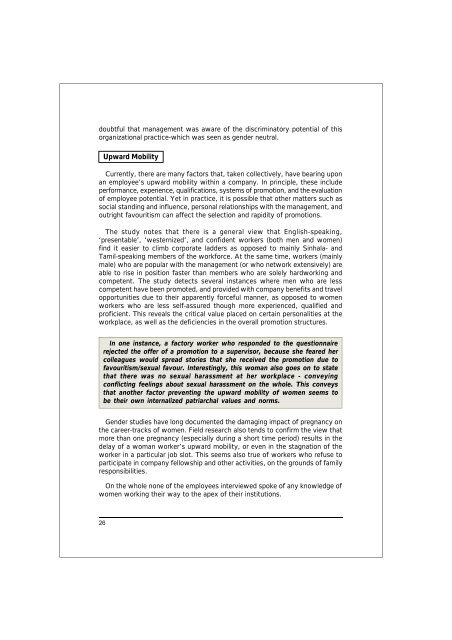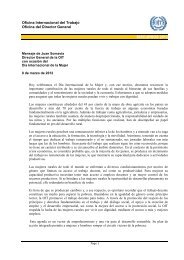Beyond Glass Ceilings and Brick Walls - International Labour ...
Beyond Glass Ceilings and Brick Walls - International Labour ...
Beyond Glass Ceilings and Brick Walls - International Labour ...
You also want an ePaper? Increase the reach of your titles
YUMPU automatically turns print PDFs into web optimized ePapers that Google loves.
doubtful that management was aware of the discriminatory potential of this<br />
organizational practice-which was seen as gender neutral.<br />
Upward Mobility<br />
Currently, there are many factors that, taken collectively, have bearing upon<br />
an employee’s upward mobility within a company. In principle, these include<br />
performance, experience, qualifications, systems of promotion, <strong>and</strong> the evaluation<br />
of employee potential. Yet in practice, it is possible that other matters such as<br />
social st<strong>and</strong>ing <strong>and</strong> influence, personal relationships with the management, <strong>and</strong><br />
outright favouritism can affect the selection <strong>and</strong> rapidity of promotions.<br />
The study notes that there is a general view that English-speaking,<br />
‘presentable’, ‘westernized’, <strong>and</strong> confident workers (both men <strong>and</strong> women)<br />
find it easier to climb corporate ladders as opposed to mainly Sinhala- <strong>and</strong><br />
Tamil-speaking members of the workforce. At the same time, workers (mainly<br />
male) who are popular with the management (or who network extensively) are<br />
able to rise in position faster than members who are solely hardworking <strong>and</strong><br />
competent. The study detects several instances where men who are less<br />
competent have been promoted, <strong>and</strong> provided with company benefits <strong>and</strong> travel<br />
opportunities due to their apparently forceful manner, as opposed to women<br />
workers who are less self-assured though more experienced, qualified <strong>and</strong><br />
proficient. This reveals the critical value placed on certain personalities at the<br />
workplace, as well as the deficiencies in the overall promotion structures.<br />
In one instance, a factory worker who responded to the questionnaire<br />
rejected the offer of a promotion to a supervisor, because she feared her<br />
colleagues would spread stories that she received the promotion due to<br />
favouritism/sexual favour. Interestingly, this woman also goes on to state<br />
that there was no sexual harassment at her workplace - conveying<br />
conflicting feelings about sexual harassment on the whole. This conveys<br />
that another factor preventing the upward mobility of women seems to<br />
be their own internalized patriarchal values <strong>and</strong> norms.<br />
Gender studies have long documented the damaging impact of pregnancy on<br />
the career-tracks of women. Field research also tends to confirm the view that<br />
more than one pregnancy (especially during a short time period) results in the<br />
delay of a woman worker’s upward mobility, or even in the stagnation of the<br />
worker in a particular job slot. This seems also true of workers who refuse to<br />
participate in company fellowship <strong>and</strong> other activities, on the grounds of family<br />
responsibilities.<br />
On the whole none of the employees interviewed spoke of any knowledge of<br />
women working their way to the apex of their institutions.<br />
26
















